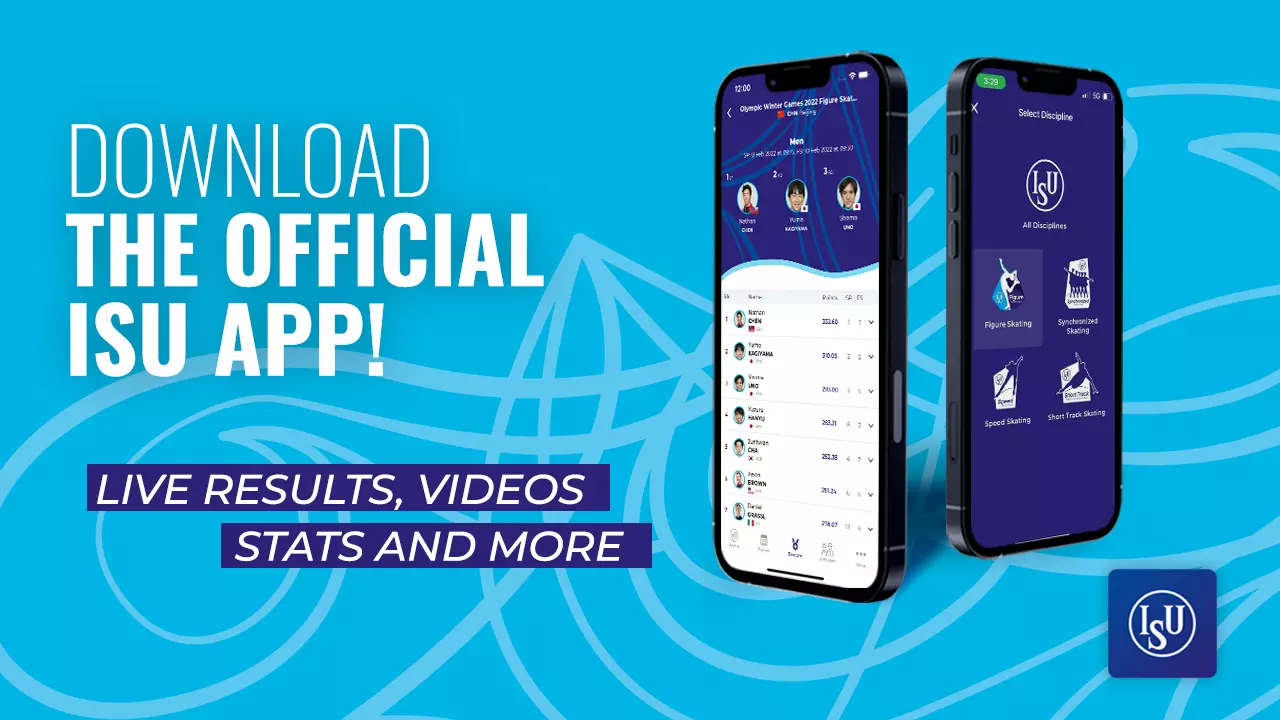Ragne Wiklund (NOR) won the 3000m, beating Miho Takagi’s 2020 home ice track record by a two-second margin to conclude women’s competition at the first ISU World Cup event of the season in Obihiro.
With the Mixed Gender Relay making its debut on the World Cup program, the enthusiastic crowd enjoyed a spectacular finale at the at the Meiji Hokkaido Tokachi Oval on Sunday. Wesly Dijs and Femke Kok took gold for the Netherlands and were enthusiastic about the event’s future potential, despite a few hiccups.
Metronomic Wiklund seizes track record
World Champion Wiklund had to set the benchmark in the 3000m, coming on in the fifth pairing versus Czech veteran Martina Sáblíková, and the Norwegian skater did exactly that.
Leaving Sáblíková behind with a 20.13 opener, she skated a very even race with a sub-31-second first full lap and five sub-32-second laps to finish with a strong 32.45s lap for a total time of 4 minutes and 1.88s, 2.09s faster than Takagi’s previous track record.
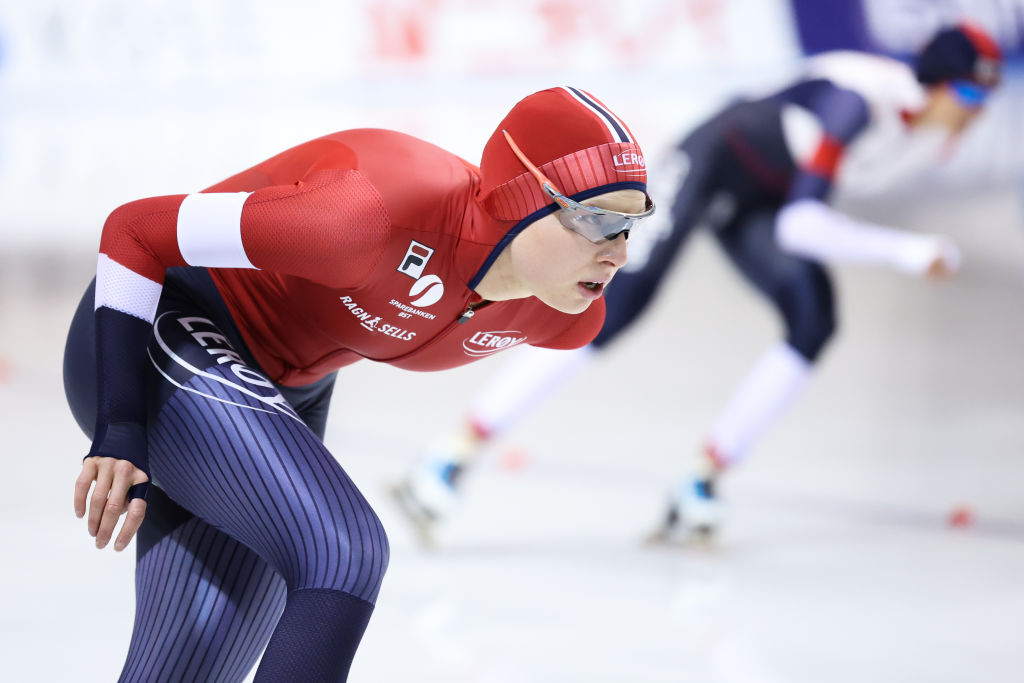
Regne Wiklund (NOR) slashed more than two seconds off the Obihiro track record with a very even race in taking gold in the 3000m © ISU
“I was hoping to be able to fight for the track record. My races in Norway so far this season have been good enough to go around in 4:03 here, so everything under that is good,” Wiklund said.
“I'm very happy [with my race], we were not knowing quite what my level was going into the weekend.”
Wiklund did not want to jump to conclusions after the first international competition of the season, however.
“This was good, but there are still some names missing from the list, so we’ll see next weekend.”
She was referring to the absent Dutch pair of Olympic champion Irene Schouten and Marijke Groenewoud, who decided to skip the first World Cup meeting but who will be present at the second round next week in Beijing.
She is looking forward to the increased competition: “It will be fun. One more week here in Asia, is also good for getting used to the time difference and everything.”
Behind Wiklund, Momoka Horikawa (JPN) seized silver, adding an individual medal to Saturday’s Team Pursuit gold.
“I really can’t quite believe it,” Horikawa said. “Winning the Team Pursuit gold was thanks to Miho Takagi and Ayano Sato (JPN), but this one I won on my own merits, that’s a different feeling.
“Today also my whole family was here to cheer me on and they were even celebrating my medal more than I did myself,” she said with a modest smile.
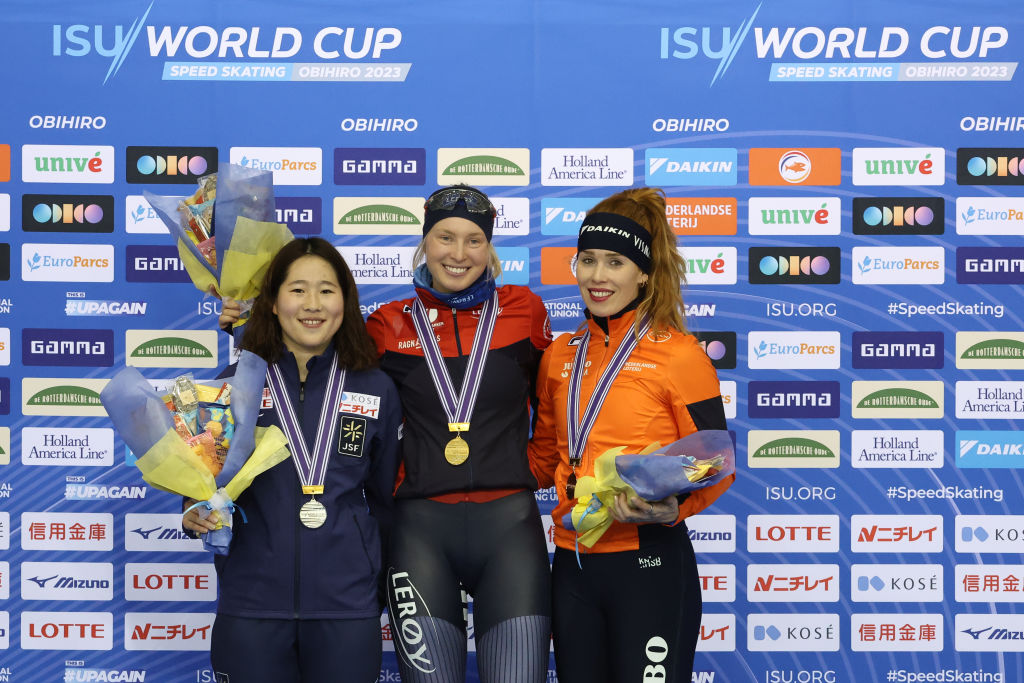
Momoka Horikawa (JPN,left) added silver to Team Pursuit gold and Antoinette Rijpma-de Jong (NED, right) battled successfully for bronze © ISU
Antoinette Rijpma-de Jong (NED) battled herself towards the bronze medal in a tough fight with pair-mate and compatriot Joy Beune (NED). After having taken the initiative in the first four laps, Rijpma-de Jong seemed to have overestimated her strength. Beune fought back and took the lead, but she too felt the fatigue sink in towards the end of the race. Her gradually slowing pace ignited the warrior in Rijpma-de Jong.
Rijpma-de Jong finished in 4:03.71, with Beune trailing 0.18 seconds to come in fourth.
“I had the last inner corner, so I had to go all or nothing,” said Rijpma-de Jong. “It’s the moment when the fighting mentality takes over, and I’m glad it eventually got me onto the podium.”
Mixed Gender Relay makes a spectacular entrance
“I think it’s a fun event with a lot of potential for the future, but it’s still work in progress,” said Wesly Dijs after winning gold alongside Femke Kok in the maiden Mixed Gender Relay at the ISU Speed Skating World Cup.
The Dutch pair finished second but were promoted to first place after Canada were disqualified because Antoine Gélinas-Beaulieu did not hold his line on the final straight. He hit Dijs, who came into the finish with more speed from behind before crashing and gliding over the finish line on his belly.
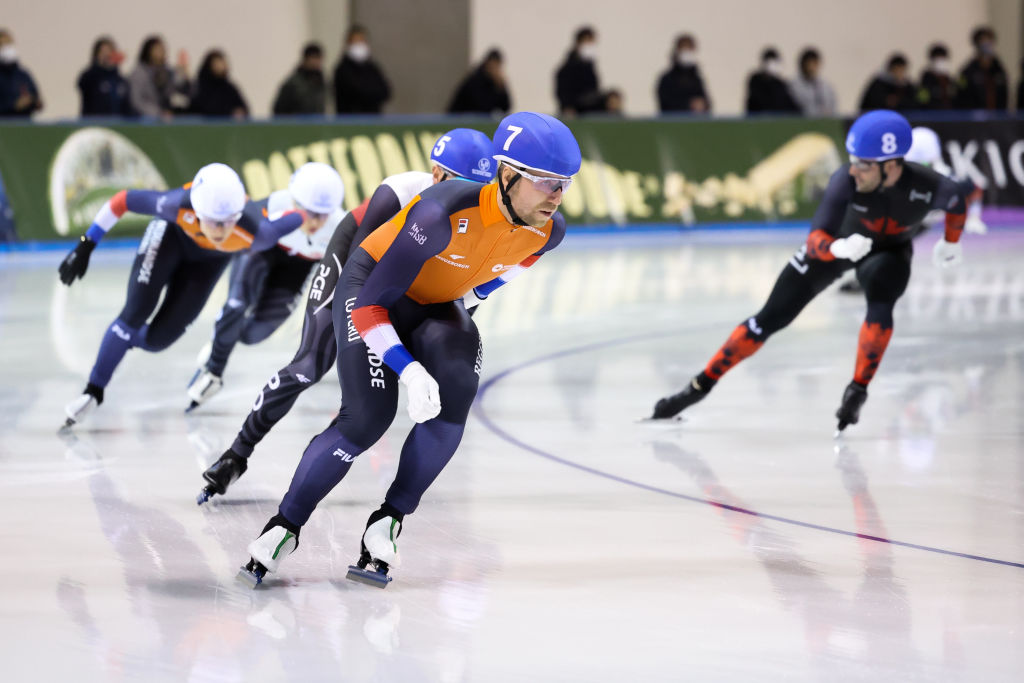
Wesly Dijs (NED) heads the field in the second heat of the Mixed Gender Relay which he went on to win alongside Femke Kok © ISU
Gélinas-Beaulieu accepted the decision with a smile.
“This is the type of event that I like. There’s a lot of chaos, a lot of things happening, and I think I excelled today, but something unfortunate happens and in some eyes, I did a bad move. Those things happen,” the Canadian said.
His teammate Ivanie Blondin was not so Zen about it.
“Tony held his line and Wesly ran into him and fell. Now, they’re calling us on the disqualification. If you run into someone coming from behind, that should not be a disqualification,” she protested.
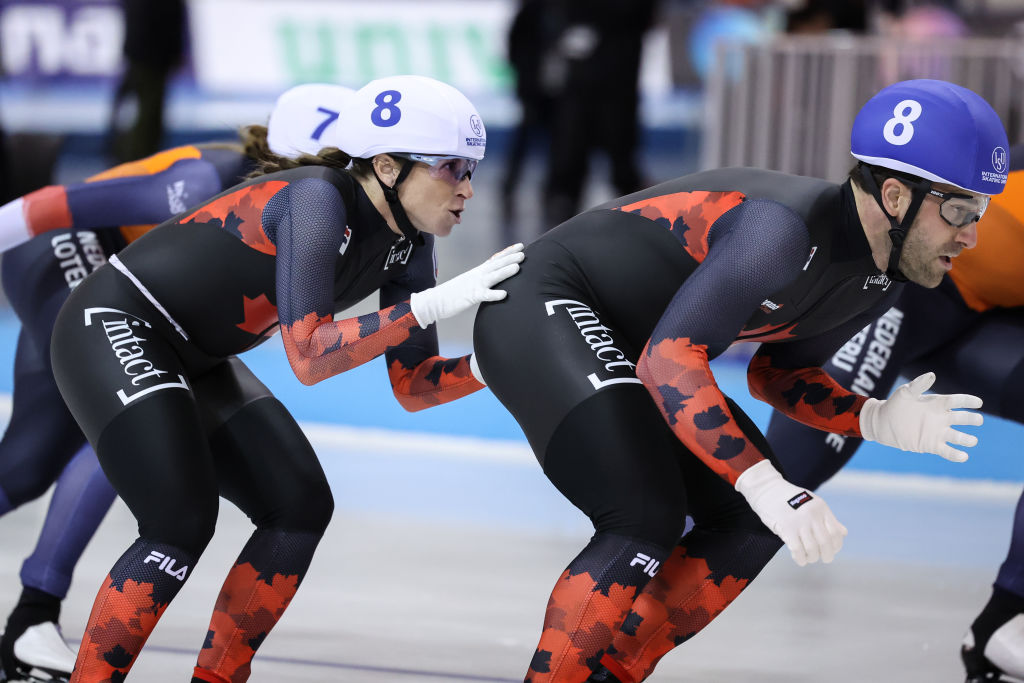
Canadian pair Ivanie Blondin and Antoine Gélinas-Beaulieu crossed the line first in their Mixed Relay heat but were later disqualified © ISU
Dijs had a different view of the incident.
“Normally you both skate a straight line, it’s the same as in bike racing," he said. "If you don’t hold your line, you’ll crash into someone else. I guess that if you know you’re not the fastest, you’ll seek other ways to win.”
Despite the finish-line hiccup, Dijs and Kok were both very enthusiastic about the new event, and they were already thinking about improvements too.
“There should be clearer rules about the exchanges, and maybe the change zone should be extended to 100m [instead of 50m]," said Dijs.
“I also think it might be better to skate with teams of four instead of two, two men and two women. In that case there will be a fresh skater for the final sprint, which would make it even more spectacular for the public. And maybe you should have an elimination system like in short track [instead of time-judged winners after different heats].”
Kok agreed and added: “But all-in-all it was a fun experience and it definitely has a bright future.”
Behind the Netherlands, Poland’s Karolina Bosiek and Damian Zurek took silver, while Kimi Goetz and Conor McDermott-Mostowy seized bronze for the United States.
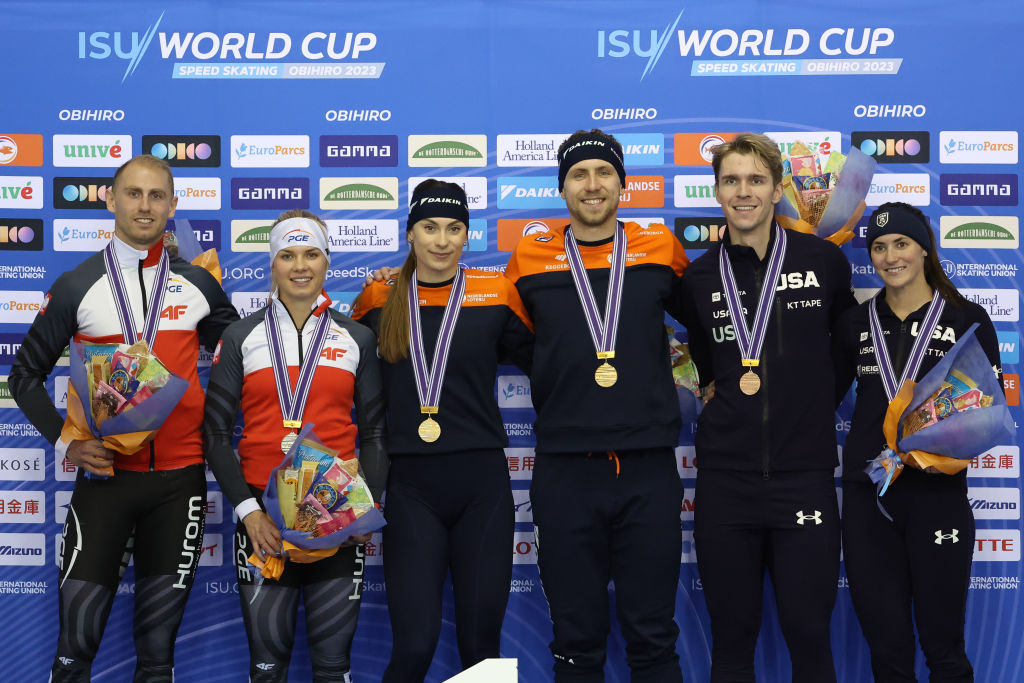
Femke Kok and Wesley Dijs (NED) won the first ever World Cup Mixed Relay gold, Poland and USA joining them on the podium © ISU
The Americans had also enjoyed their first taste of the new event.
“It’s hard, it’s fun, it’s unique,” was Goetz’s first reaction. “It’s fun to skate with a team-mate you never get to skate with. It’s different, but like all new things, it needs to be ironed out.”
Conor McDermott-Mostowy agreed: “There are definitely some things that need to be ironed out. The exchange is huge. If the groups are close together, having the first group stay tight is not super safe. But again, it's brand new, so everybody just needs to practise a little bit.”
For all information about the ISU World Cup Speed Skating Series, please visit the webpage here.
All Media Accreditations details and deadlines for the ISU World Cup Short Track Speed Skating Series can be found here.
Where to watch
Viewers will be able to watch the World Cup sessions via their national broadcaster/channel.
For countries where there are no broadcasters, the ISU will offer a live stream with English commentary on the Skating ISU YouTube Channel. You will find the full list on the Where to watch webpage here.
Subscribe to the ISU YouTube Channel to receive all the latest videos and follow the conversation with #SpeedSkating.
ISU World Cup Short Track Speed Skating Series events 2023/24:
Nov 10 - 12, 2023 Obihiro /JPN
Nov 17 - 19, 2023 Beijing /CHN
Dec 01 - 03, 2023 Stavanger /NOR
Dec 08 - 10, 2023 Tomaszów Mazowiecki /POL
Jan 26 - 28, 2024 Salt Lake City /USA
Feb 02 - 04, 2024 Québec /CAN
About ISU World Cup Speed Skating Series
The ISU World Cup Speed Skating is a Series of Speed Skating competitions which have taken place annually since 1984. The series comprises six events (four during an Olympic season), with A Division and B Division races. Skaters can earn points at each competition, and the Skater with the most points on a given distance at the end of the series is the World Cup winner in that distance. The four World Cup Competitions held from November to December serve as qualifying events for entry quotas at the ISU European Championships, and the ISU Four Continents Championships. The whole series of six events serves as qualifying events for the World Single Distances Championships, and/or the World Sprint and Allround Speed Skating Championships.
World Cup titles are awarded in 500m, 1000m, 1500m, combined 5000m/10,000m, and Mass Start for men, and 500m, 1000m, 1500m, the combined 3000m/5000m, and Mass Start for women. Both genders also compete for the World Cup titles in Team Pursuit and Team Sprint. New in the 2023/24 program is the Mixed Gender Relay over six laps, in which teams of one man and one woman compete.
(For full explanation of this season’s ISU World Cup (entry rules, formats, qualifying, and prizes: https://www.isu.org/speed-skating/rules/ssk-communications/31562-isu-communication-2587/file)

